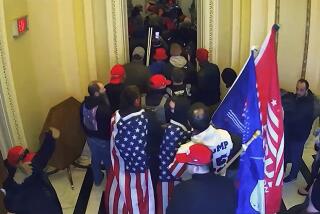In Senate, No Rules Prevail to Hold Trial
- Share via
WASHINGTON — The United States Senate is in full session, but that’s not Vice President Al Gore presiding. It’s Chief Justice William H. Rehnquist, somber in his black robe.
Arrayed before the chief justice in semicircles, 55 Republicans to his left and 45 Democrats to his right, the senators sit behind their flip-top mahogany desks in unaccustomed silence. If they have anything to say, they must put it in writing and send it up to Rehnquist.
Welcome to the trial of the century--the extraordinary proceeding that could unfold early next year if the House of Representatives approves articles of impeachment against President Clinton next week.
That the 91 men and nine women are barred from speaking--like jurors in courtrooms all across America--is one of the few concrete rules in place.
In a Senate trial to oust a president, there are no set rules of evidence, there is no definition of burden of proof. And the inevitable procedural clashes may well engender partisan wrangling that drags the proceedings well into the spring and possibly beyond.
“I can think of hundreds of issues,” said Senate Judiciary Committee Chairman Orrin G. Hatch (R-Utah). “This could tie up the Senate for a year or more.”
Two-Thirds Needed on Final Vote
The Constitution requires a two-thirds vote to overturn a national election and fire a chief executive. But on virtually every other issue along the way, the Senate can do what it wants by a simple majority vote, including shutting down the proceeding altogether.
As the House nears an impeachment vote that is too close to call, the Senate side of the Capitol has become rife with partisan maneuverings and logistics. As remarkable as the impeachment debate has been in the House, that spectacle would pale beside what may come next.
The Senate has conducted exactly 14 trials: of 12 judges, one Cabinet officer and one president. Andrew Johnson escaped removal from office in 1868 when the Senate fell a single vote short of the two-thirds majority necessary to convict.
Intense partisanship engulfed nearly all the trials, according to Eleanore Bushnell and Michael J. Gerhardt, authors of books on impeachment. And unlike rulings in most courts of law, impeachment trials have not established precedents for those that followed.
“Each one is essentially new and a product of the political environment in which it takes place,” Bushnell said.
Even without partisanship, an impeachment trial would pose a dizzying array of legal issues. Gerhardt, a William and Mary College law professor, said the Senate would have to consider seriously several procedural issues: “Do you rely on transcripts or live witnesses? Does executive privilege apply? Does the attorney-client privilege apply?”
A trial raises the prospect of key figures in the scandal, such as Monica S. Lewinsky and Linda Tripp, being called to testify under oath in the Senate chamber about the salacious details of the affair. Those details are at the core of the perjury allegations against Clinton.
Rehnquist, himself the author of a book on two impeachment trials, would be empowered to rule on evidentiary matters and other motions. But a simple majority of senators could overrule his decisions.
“I can envision the better part of January might be spent trying to clean up just the procedural issues,” Gerhardt said.
New Senators Must Be Sworn In
The new Senate convenes on Jan. 6. Only after the eight newly elected members are sworn in can it officially receive a notice of impeachment from the House.
(Three of the new members--Democrat Charles E. Shumer of New York and Republicans Jim Bunning of Kentucky and Michael D. Crapo of Idaho--will have voted as House members on whether to send Clinton’s case to the Senate.)
Then the Senate will set a time and date to formally receive House Judiciary Committee Chairman Henry J. Hyde (R-Ill.), who is expected to serve as “manager”--that is, prosecutor--of the case against Clinton. The president may choose anyone to represent him.
“My guess is that would be the next day,” said Senate Parliamentarian Robert B. Dove.
Setting Time, Date for Trial
On the Senate floor, Hyde would read the articles of impeachment. Then the Senate would adopt an order setting a time and date for the trial to commence.
At 1 p.m. on opening day, Rehnquist would be sworn in--either by Gore or, if the vice president opted not to participate, by the Senate president pro tem, Strom Thurmond (R-S.C.).
After taking their oaths as jurors, senators would summon the president--or his lawyers--to appear for trial.
Clinton is not required to attend and is expected to maintain a healthy distance from the Senate floor.
Next would come 30 days or so for the White House to prepare its response to the articles of impeachment, followed by perhaps 10 days for Hyde’s team to respond. “At that point we start probably with motions, such as a motion to dismiss,” Dove said.
Several Senate Democrats are drafting censure resolutions to short-circuit a full-blown trial. But it is far from clear if a majority of senators--including some traditionalist Democrats--would agree to what Sen. Robert C. Byrd (D-W.Va.) called “a cop-out” of the Senate’s constitutional duties.
Once motions and procedural issues were settled, Dove said, “we start the evidentiary period: witnesses are called, examined by one side and then cross-examined, just as in a trial.”
What amounts to the jury deliberation would take place behind closed doors, with each senator allowed to speak for no more than 15 minutes.
The casting of the verdict would come in open chamber, with each senator standing to announce his or her decision after individually choosing from among three possible burdens of proof: beyond a reasonable doubt, clear and convincing, or preponderance of evidence.
If 67 of the 100 senators vote to convict on just one article of impeachment, Clinton would immediately cease to be president. It’s an open question, Dove said, whether senators would continue voting on the other articles.
After conviction, the Senate could exercise its further prerogative of barring--by a simple majority vote--the president from ever holding again “any office of honor, trust or profit under the United States.”
If 34 or more senators voted to acquit the president on all charges, he would remain in office.
Virtually no one believes Senate Republicans could attract the 12 Democrats they would need to reach the 67 senators required for conviction, although former California Rep. Leon E. Panetta, who served Clinton as White House chief of staff, said nothing in this drama can be taken for granted.
“If you go to trial and these witnesses are all presented for the first time and cross-examined, you can’t just assume it’s a done deal as far as the Senate is concerned,” he said.
Rules Address Many Issues
The last time the Senate adopted rules governing impeachment trials was in 1986. The rules address a host of issues large and small, including even the precise time of day when the Senate is supposed to convene.
But sprinkled throughout the 101-page rule book is a key phrase--”unless otherwise ordered by the Senate”--that lets the Senate adopt whatever rules it chooses. “The rules are laced with all kinds of caveats,” said a top Senate Republican leadership aide.
This much is sure: Clinton would have nowhere to appeal a conviction. “You lose here,” Dove said, “you’ve lost.”
More to Read
Get the L.A. Times Politics newsletter
Deeply reported insights into legislation, politics and policy from Sacramento, Washington and beyond. In your inbox twice per week.
You may occasionally receive promotional content from the Los Angeles Times.










